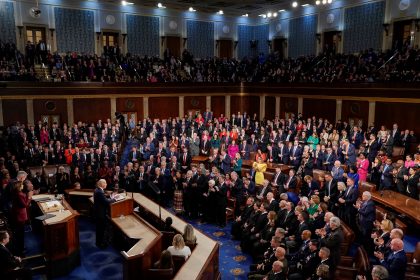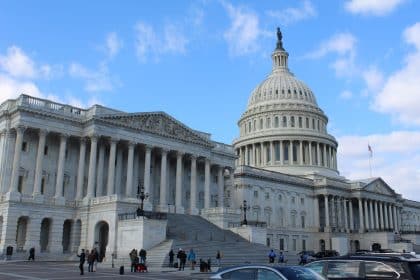Analyst Discusses Fitch Ratings Downgrade of US Credit Rating, Says ‘Rome Isn’t Burning’

WASHINGTON — Fitch Ratings downgraded the U.S. credit rating from AAA to AA+ last week. One of the big three credit rating agencies, Fitch determined this first downgrade since 2011 was necessary due to continued erosion of governance, fiscal deterioration and growing government debt.
While this had some immediate effects on markets, the longer-term implications of the credit rating downgrade are less obvious. Some analysts believe the news will largely be dismissed rather than have any lasting disruptive impact on the U.S. economy and markets. Others are more cautious.
A AA+, or Very Safe, rating still indicates very low credit risk and that the issuer has a strong capacity to repay.
“Rome isn’t burning,” assured Marc Goldwein, senior policy director at the Committee for a Responsible Federal Budget, in a call to reporters the day following the downgrade news.
Fitch’s move came two months after a debt ceiling agreement lifted the U.S. government’s $31.4 trillion borrowing limit, leading detractors — including U.S. Treasury Secretary Janet Yellen — to call it “arbitrary and based on outdated data.”
Fitch also included findings that the “national debt has soared and is showing no signs of slowing” and that “it is unlikely Congress will act to rein in debt before the 2024 presidential election.” An “erosion of governance” after Jan. 6, 2021, was also called out.
As a result of the downgrade, the S&P, Nasdaq and Dow immediately lost value, though markets have since stabilized. The yield on the benchmark U.S. Treasury note fell 2 basis points on the day of Fitch’s news, but largely, investors have been calm about the longer-term impact of the action.

“Markets are taking this OK,” Goldwein said. “Hopefully Very Safe is still going to be good enough for us.”
Goldwein still believes federal budget and fiscal issues need to be addressed even if markets aren’t reeling.
“Fitch points to our inability to pass budgets or have a median budget plan of any sort,” Goldwein said. “Fitch talks about this quite a bit. … We came quite close to the deadline and this playing chicken with the debt limit puts the full faith and credit of [the United States] at risk.”
But Goldwein agrees with Yellen that the timing of the downgrade is unusual.
“Many of the things Fitch points to are in better shape now than they were two or three months ago,” Goldwein said, and he fears that the actual result of the news will be the creation of more division within the U.S. political landscape.
“[It might] create bigger standoffs where we’re more likely to have shutdowns,” he said, and this “will prove that we’re broken.”
Downgrades, even of a minimal nature, do have potential long-term implications for the U.S. credit landscape, as well as other repercussions if investor sentiment shifts towards cautiousness over the nation’s fiscal health and ability to service its debt obligations.
“Once you are downgraded, as you get lower down the ratings rung, you do have consequences,” Goldwein said.
Long-term the U.S. credit landscape could see a rise in borrowing costs, currency depreciation and global market repercussions.
A downgrade in credit rating signals to investors that the U.S. may pose a higher risk of defaulting on its obligations. As a result, the government may face higher borrowing costs, translating into increased interest payments on its debt. This could exacerbate the existing budget deficit and hinder efforts to reduce the nation’s overall debt burden.
The U.S. dollar has traditionally been regarded as a safe-haven currency, but a credit rating downgrade can erode this perception. Investors may seek alternative currencies or assets, leading to a depreciation of the dollar. A weaker dollar could fuel inflationary pressures and increase the cost of imports, further straining the economy.
Uncertainty and market volatility may intensify, affecting trade, investment and financial stability in other countries, especially those with significant ties to the U.S.
And a U.S. credit rating downgrade could dent investor confidence, leading to reduced investment in domestic markets and heightened caution from international investors. A loss of confidence in the U.S. economy’s resilience could result in a slowdown of economic growth, hindering the nation’s long-term prosperity.
“My fear [is] that, instead of taking this as a wake-up call, we start beating each other up,” Goldwein said.
“There is a case that maybe this was hasty, but fundamentally, the issues that Fitch points to are the right ones,” he added.
The downgrade serves as a stark reminder of the importance of working together to maintain fiscal responsibility and implementing prudent economic policies to safeguard the nation’s creditworthiness and financial standing on the global stage.
“If all we do is start to govern responsibly, I think we’ll be at AA+ for quite some time. If we want to improve, we need to improve our fiscal outlook and improve our governance.”
Countries currently holding AAA ratings from S&P Global Ratings, Fitch, and Moody’s Investors Service include Germany, Denmark, Netherlands, Sweden, Norway, Switzerland, Luxembourg, Singapore and Australia.
You can reach us at [email protected] and follow us on Facebook and Twitter
























